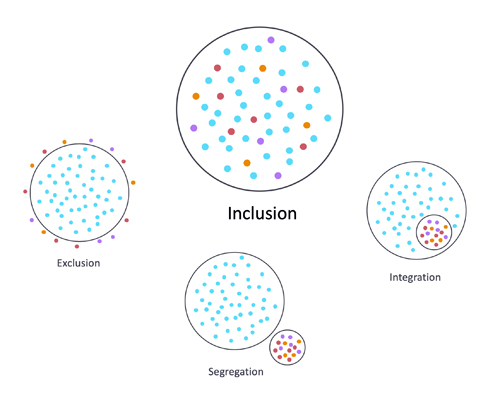
APS Director Stephen Streiffer and the Photon Sciences (PSC) Directorate Diversity and Inclusion Council strongly encouraged staff and beamline personnel to take advantage of the latest Argonne initiative on diversity, equity, and inclusion.
In the workshop, “Equity-mindedness: Identifying and Interrupting Implicit Bias through Candid Conversations,” participants learn more about their own socialization and social identities along with the conscious and unconscious prejudices and bias they may hold. Furthermore, they learn to identify and challenge unexamined beliefs about self and others and understand how these beliefs have contributed to inequity.
Here’s a description of implicit bias according to the Kirwan Institute at Ohio State University:
Also known as implicit social cognition, implicit bias refers to the attitudes or stereotypes that affect our understanding, actions, and decisions in an unconscious manner. These biases, which encompass both favorable and unfavorable assessments, are activated involuntarily and without an individual’s awareness or intentional control. Residing deep in the subconscious, these biases are different from known biases that individuals may choose to conceal for the purposes of social and/or political correctness. Rather, implicit biases are not accessible through introspection.
The implicit associations we harbor in our subconscious cause us to have feelings and attitudes about other people based on characteristics such as race, ethnicity, age, and appearance. These associations develop over the course of a lifetime beginning at a very early age through exposure to direct and indirect messages. In addition to early life experiences, the media and news programming are often-cited origins of implicit associations.
A Few Key Characteristics of Implicit Biases
- Implicit biases are pervasive. Everyone possesses them, even people with avowed commitments to impartiality such as judges.
- Implicit and explicit biases are related, but distinct mental constructs. They are not mutually exclusive and may even reinforce each other.
- The implicit associations we hold do not necessarily align with our declared beliefs or even reflect stances we would explicitly endorse.
- We generally tend to hold implicit biases that favor our own ingroup, though research has shown that we can still hold implicit biases against our ingroup.
- Implicit biases are malleable. Our brains are incredibly complex, and the implicit associations that we have formed can be gradually unlearned through a variety of de-biasing techniques.
To find out more about the PSC Council and their ongoing activities, please visit the website at https://www.aps.anl.gov/About/Committees/Diversity-Equity-Inclusion.
